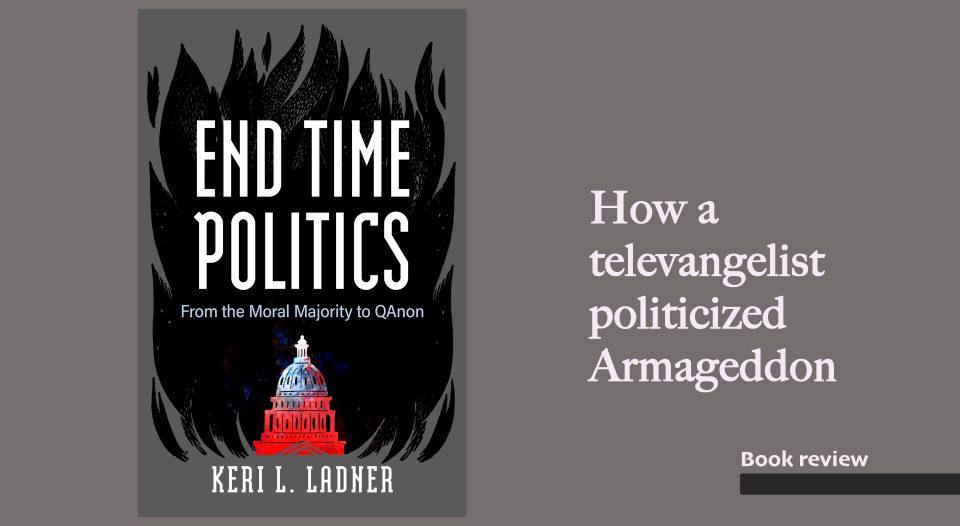Apart from Martin Luther King Jr., has any Christian leader had a greater impact on our contemporary political landscape than the Baptist televangelist Jerry Falwell Sr.? A founder of the 1980s interest group the Moral Majority—which united social conservatives of every stripe to advocate against abortion, pornography, welfare, gay rights and anything that even hinted at communism—Falwell dragged fundamentalism into the Christian mainstream and, once it had arrived, erased the invisible line separating conservative Christianity from political activism. In popularizing the notion that the U.S. Constitution was the will of God and that the country it governed was special in God’s eyes, Falwell set the stage for today’s Christian nationalism.
In End Time Politics: From the Moral Majority to QAnon (Fortress Press, 2024), Keri L. Ladner explores the theology behind Falwell’s political crusade and how his firm belief in the “end times”—that period when Christ will supposedly return to earth and sort everything out—took root in the popular culture, inspiring the bestselling “Left Behind” novels in the 1990s and ultimately fueling the January 2021 attack on the U.S. Capitol. End Time Politics is a serious book about theology, yet it profiles a man whose theology wasn’t always serious; more than once Ladner arrives at the conclusion that Falwell tailored his religious doctrine to serve his social and political beliefs.
As a young, upstart preacher in Virginia in the 1950s, Falwell embraced dispensationalism, which was developed by the Anglo-Irish evangelist John Nelson Darby in the early 19th century and spread like crabgrass across the U.S. Protestant landscape in the 20th thanks to the widely read Scofield Reference Bible. “Dispensations” are the historical epochs of God’s grace and wrath. The first unfolded in the Garden of Eden, and it set the pattern for each that followed: God dispenses God’s grace, the people betray God, and God unleashes God’s wrath. Darby believed we live in the last dispensation, awaiting the punishment we’ve earned. At some point Christ will return to earth, transport the faithful to heaven (“the Rapture”) and leave the rest to suffer for seven years under the reign of the Antichrist (“the Tribulation”) before Jesus returns again to reclaim the throne of David.
End Time Politics is a serious book about theology, yet it profiles a man whose theology wasn’t always serious.
This vision of societal collapse and final judgment informed everything Falwell preached, yet as Ladner points out, he tended to embrace the parts of dispensationalism he liked and ignore the ones he didn’t. Darby taught that the established Christian churches were hopelessly corrupt and that true Christians should retreat not only from them but from society. Falwell may have practiced this separatism to some extent, starting a Christian (and racially segregated) school and university to shield young minds from secular ideas. Yet he enjoyed celebrity, and by creating the Moral Majority he led millions of conservative evangelicals into the public square for the first time.
Finding a coherent theology in Falwell’s preaching and teaching proves so difficult for Ladner that, in the end, she turns to economics as a way of understanding what his Christianity was all about. Throughout the 19th century and into the 20th, U.S. Protestants divided along familiar liberal-conservative lines, one camp embracing a “Social Gospel” of helping the less fortunate and the other a “biblical capitalism” that used Scripture to defend the profit motive and exalt the big winners. By the time Falwell came of age, at the height of the Cold War, dispensational theology was already being applied to the struggle between the United States and the Soviet Union. In Falwell’s mind the Soviets were no less than Gog, the mysterious nemesis of God cited in Ezekiel and Revelation.
When Ladner switches lenses from religious faith to anti-communism, everything falls into place. Falwell believed that because communism was irreligious, it was a tool of the Antichrist, so anyone who advanced socialistic ideas rebelled against God, whether that was King in the 1950s and ’60s or South African anti-apartheid leaders Nelson Mandela and Bishop Desmond Tutu in the ’80s. Federal welfare programs in the United States were inherently communist because they redistributed wealth, so Falwell supported President Ronald Reagan’s gospel of cutting food-stamp programs and ramping up the nuclear arms race against the Soviet Union.
Regardless of Falwell’s true motivation, he fell back on dispensational rhetoric time and again, amplifying the element of end times prophecy that so fascinated listeners. Falwell read the great conflict between Israel and the forces of Gog in Ezekiel 38-39 as a prophecy that the Soviet Union would invade modern-day Israel as part of the Tribulation. (“As gold is purified through the heat of fire, so the nation of Israel will come through the Tribulation fit for the Master’s use,” wrote Falwell in the booklet Nuclear War and the Second Coming of Jesus.) Yet even in this instance, Ladner observes, Falwell couldn’t keep his theology straight. Darby, the father of dispensational theology, had discouraged the idea that prophecy from an earlier dispensation might be fulfilled in this one. That would all come after Christ returned.
Regardless of Falwell’s true motivation, he fell back on dispensational rhetoric time and again, amplifying the element of end times prophecy that so fascinated listeners.
Alongside Falwell’s political journey, End Time Politics traces the growing polarization between liberal and conservative Christianity from the Civil War era onward, a divide widened in the 20th century by the New Deal, the civil rights movement, Roe v. Wade and the fight for LGBT rights. This history provides a broader perspective on Falwell’s thinking and underscores what a consequential figure he truly was, radicalizing millions of Christian fundamentalists who had been shamed into keeping quiet about their beliefs. It also paves the way for Ladner’s concluding chapter, in which she tries to connect Falwell to the QAnon phenomenon and the Jan. 6 riot.
This is the most speculative portion of End Time Politics, reading more like an attempt to position the book in the contemporary marketplace than an essential part of Ladner’s study. By the time of the Jan. 6 riot Falwell had been dead for 13 years, and despite the Christian nationalist placards on display at the Capitol that afternoon, the rioters who poured into the building were driven more by fantasies of electoral fraud than any sort of spiritual agenda. Yet few would dispute Ladner’s assertion that Falwell’s “binary worldview” had contributed to the boiling hatred or that the riot “reveal[ed] a movement that has divorced itself completely from the Bible while retaining Falwell’s conspiratorial thinking.”
Among members of the Evangelical Lutheran Church in America there is growing sentiment that the word “evangelical” does the denomination no favors in the court of public opinion, and that, too, is part of Falwell’s legacy. Before him, as Ladner points out, evangelicals were quiet churchgoers who worked to spread the gospel of Jesus; now they’re a fundamentalist voting bloc, primed for battle with the secular left. Falwell may have transformed evangelical Christianity, introducing it to the pleasure of power in this world. But there’s no telling how many spiritual seekers over the years have sampled his confused theology and walked away, not from liberals or libertinism but from the Christ he professed to love so much.






